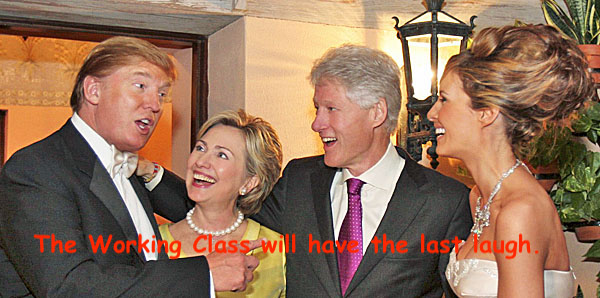Pic Via @cjwerleman on Twitter
Find this campaign pin incredible? Read this from Ted Glick's blog "Racism and Presidential Elections Since 1964: A Short History" http://academic.udayton.edu/race/2008electionandracism/raceandracism/racism2004.htm
Cited books are "The Great Wells of Democracy," by Manning Marable, and "Nixon's Piano: Presidents and Racial Politics from Washington to Clinton," by Kenneth O'Reilly. ********
"By late May 1992 Bill Clinton had all but sown up his party 's presidential nomination, but in national polls he was running a poor third in the projected general election that was only months away, behind the incumbent president, George Bush, and independent candidate H. Ross Perot. What Clinton needed was an event to distinguish himself as a 'different kind of Democrat.' Following Reagan's model, he decided to manipulate the politics of race. . . Clinton had been scheduled to speak before the national convention of the Rainbow Coalition and, without informing Jackson in advance, decided to distance himself from the black community. Although the speech was designed to focus on issues such as urban enterprise zones and the earned-income tax credit, Clinton unexpectedly attacked the Rainbow Coalition's invitation to rap artist Sister Souljah to speak the previous evening. 'You had a rap singer here last night named Sister Souljah,' Clinton stated. 'Her comments before and after [the] Los Angeles [civil disturbances following the not guilty Rodney King verdicts] were filled with a kind of hatred that you do not honor today and tonight'. . . Clinton's rhetorical maneuver paralleled Ronald Reagan's attack against 'welfare queens' and George Bush's 'Willie Horton' advertisements. It was a strategically planned stunt, and it worked. Clinton followed it up with national interviews, explaining that 'if you want to be president, you've got to stand up for what you think is right.'" ([Manning] Marable, pps. 79-80)
But this wasn't the only instance of racial pandering. In January Clinton left New Hampshire prior to the primary vote to return to Arkansas to preside over the execution of Rickey Ray Rector, a black man who had killed a police officer 11 years earlier but who had shot himself in the head afterwards, leaving him with the mental capacity of a child. In March he posed with fellow DLC-er and Georgia Senator Sam Nunn for pictures in front of forty mostly black prisoners in their prison uniforms. "Jesse Jackson called it a moderately more civilized 'version of the Willie Horton situation.' Two weeks later, on the day after the Illinois and Michigan primaries, Clinton again showed he was a different type of Democrat by golfing nine holes, accompanied by a television camera crew, at a segregated Little Rock country club." ([Kenneth] O'Reilly, p. 410)
"Bill Clinton calculated that he could not win in 1992 unless he used Sister Souljah to bait Jesse Jackson, put a black chain gang in a crime control ad, golfed at a segregated club with a TV camera crew in tow, and allowed that search for a serviceable vein in Rickey Ray Rector's arm." (O'Reilly, p. 420)
Clinton had a much easier opponent in 1996, Bob Dole, but he wasn't going to take any chances, so he "decided to use the issue of welfare as the vehicle to shore up his support among white male voters. Only days before the 1996 Democratic National Convention, Clinton signed the 'Personal Responsibility and Work Opportunity Act,' with the stated goal of 'ending welfare as we know it.' . . . Clinton repeatedly criticized the lack of 'personal responsibility' of those on public assistance." ([Manning] Marable, p. 82)


No comments:
Post a Comment